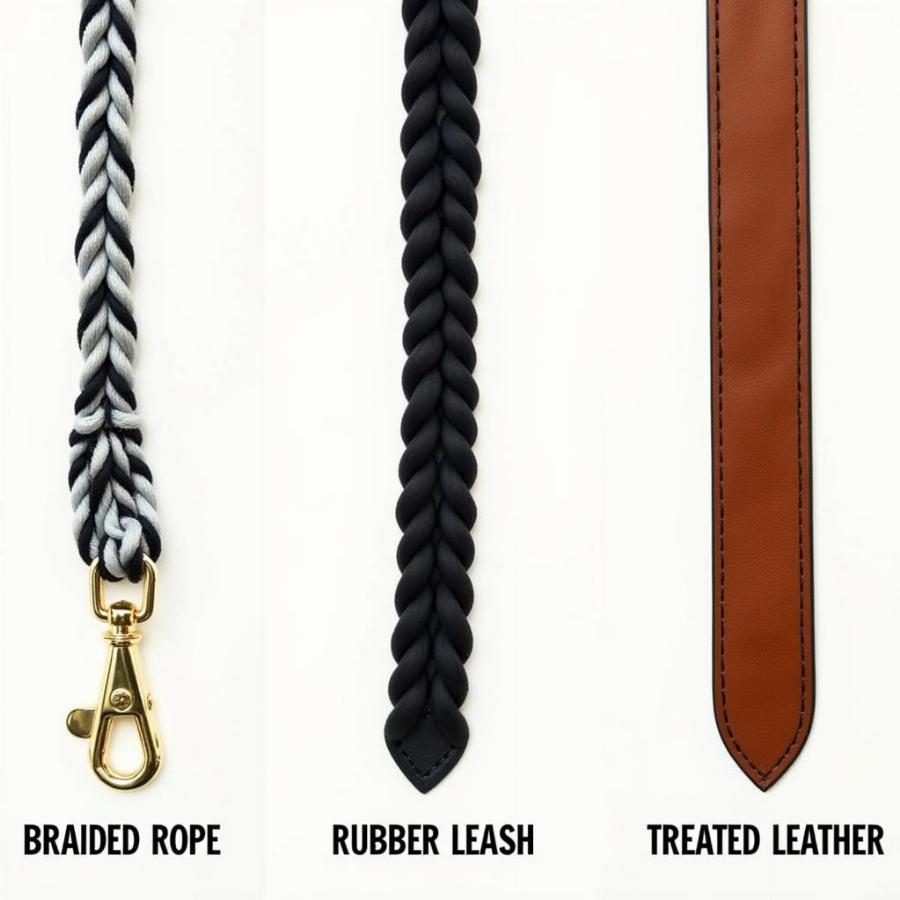Chewy dog leashes are a popular choice for pet owners, offering a unique texture and potential benefits for both dogs and their handlers. But with so many options on the market, how do you choose the right one for your furry companion? This comprehensive guide will explore the world of chewy dog leashes, covering everything from material and durability to safety and training considerations.
Choosing a chewy dog leash involves understanding your dog’s chewing habits, size, and training needs. A durable leash made from appropriate materials is crucial for safety and longevity. Consider the leash length and handle comfort for your own handling preferences. Is your dog a gentle chewer or a power chewer? This will determine the robustness you need in a leash. Are you using the leash for training, everyday walks, or something else? Purpose dictates design. Let’s delve deeper into the factors you should consider when selecting a chewy dog leash.
Understanding Chewy Dog Leashes
What makes a dog leash “chewy”? Typically, these leashes are made from materials that offer a satisfying texture for dogs who like to gnaw. These materials might include natural rubber, braided rope, or even specially treated leather. While no leash is entirely indestructible, some are designed to withstand more chewing than others.
Why Dogs Chew on Leashes
Chewing is a natural behavior for dogs. Puppies explore the world through their mouths, and adult dogs often chew to relieve stress, boredom, or teething discomfort. A chewy dog leash can offer a safe and appropriate outlet for this instinct, especially during walks when other chew toys might be impractical.
Benefits of Chewy Dog Leashes
For some dogs, a chewy leash can be a helpful training tool, providing a positive distraction during walks and reducing pulling or lunging. The texture can also be soothing for anxious dogs. However, it’s important to note that not all dogs will benefit from a chewy leash, and some may even see it as an invitation to chew excessively.
Materials and Durability
Chewy dog leashes are available in a variety of materials, each with its own pros and cons.
Rope Leashes
Rope leashes are often a top choice for chewy dogs. They offer a satisfying texture and are generally quite durable. Look for leashes made from natural fibers like hemp or cotton, as these are typically safer for dogs to chew on. However, be mindful that rope leashes can fray with excessive chewing.
Rubber Leashes
Rubber leashes are another popular option, offering a flexible and durable chewing surface. They are often waterproof and easy to clean. However, some dogs may be allergic to certain types of rubber, so choose a hypoallergenic option if your dog has sensitive skin.
Leather Leashes
While not traditionally considered “chewy,” some leather leashes are treated to be more resistant to chewing and offer a different texture for dogs who like to gnaw. These leashes are typically more expensive but can be very durable if properly cared for.
 Comparing Different Chewy Leash Materials
Comparing Different Chewy Leash Materials
Safety and Training Considerations
Supervision is Key
Never leave a dog unattended with a chewy dog leash. Even the most durable leashes can be destroyed by a determined chewer, and ingested pieces can pose a serious health risk.
Training with a Chewy Leash
While a chewy leash can be a helpful training aid for some dogs, it’s important to use it correctly. Avoid allowing your dog to chew excessively on the leash, and redirect their attention to other toys or activities when appropriate. Consider consulting a professional dog trainer for guidance on using a chewy leash for training purposes.
Choosing the Right Size and Length
Select a leash that is appropriate for your dog’s size and weight. A leash that is too thin or too long can be a safety hazard. Consider the handle comfort and length for your own handling preferences.
Frequently Asked Questions about Chewy Dog Leashes
-
Are chewy dog leashes safe for puppies? Yes, but supervision is crucial. Choose a puppy-sized leash and monitor their chewing habits closely.
-
What if my dog destroys their chewy leash? Replace the leash immediately. Ingested pieces can be dangerous.
-
Can a chewy leash help with leash training? It can be a helpful tool for some dogs, but professional guidance is recommended.
Conclusion
Chewy dog leashes can offer a unique solution for dogs who like to chew, providing a safe and satisfying outlet for their natural instincts. However, choosing the right leash involves careful consideration of your dog’s chewing habits, size, and training needs. By understanding the different materials, durability factors, and safety considerations, you can select a chewy dog leash that will benefit both you and your furry friend. Remember to always supervise your dog when using a chewy leash and consult with a professional trainer if you have any questions or concerns.
Do you have other questions about dog accessories? You might be interested in our articles on grinch dog collar or cleveland browns apparel for dogs. For those looking for stylish options, we also have a guide on rose gold dog collar. If you’re planning a fun event, check out our article on avocado dog costume. Lastly, for sports fans, we have a piece on lakers dog jersey.
Beaut Dogs is your one-stop shop for all things related to dog care, offering expert advice and valuable resources. When you need assistance, feel free to contact Email: [email protected] for detailed and accurate answers from Beaut Dogs.